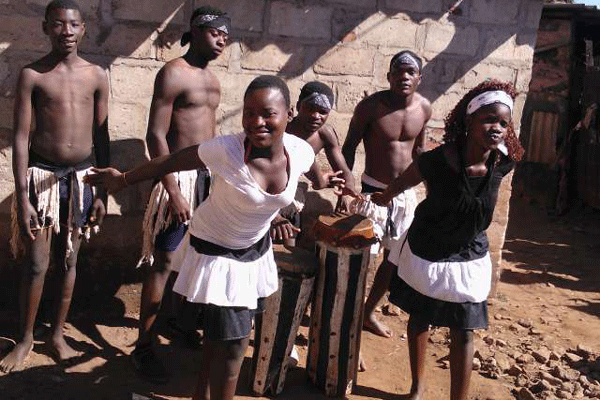
Culture is the cornerstone of every society and it defines people’s way of life. Only a handful of Zimbabweans can tell the music, dances, food, dress or how their forefathers used to live.
BY TAWANDA TADERERA
Despite the onslaught of colonialism, Christianity and westernisation, traditional dances have survived the test of time, albeit with modifications.
Gondo Harishayi traditional dance group was founded last year after splitting from Kondamani Dance Group over wage disputes. Gondo Harishayi consists of 12 members — four girls and eight boys led by Maxwell Magomwa and Tatenda Foro.
The group has participated in many events that include the popular arts fiesta Shoko Festival. Magomwa said traditional dances were not threatened by changes in culture and beliefs.
“Our culture is very important and we must value it because it is what defines us as Africans,” he said. “We want to preserve our culture and dances as an expression of culture and beliefs.”
Although in Zimbabwe, old traditions are fading away, especially in urban communities, Gondo Harishayi contiunes to practise local culture.
- Chamisa under fire over US$120K donation
- Mavhunga puts DeMbare into Chibuku quarterfinals
- Pension funds bet on Cabora Bassa oilfields
- Councils defy govt fire tender directive
Keep Reading
“I was born with a talent to dance that’s why I decided to have a part in traditional dances as a way to protect our culture through dancing. This also helps other people to have knowledge on how good to be African,” Magomwa said.
Dances like Chinyambera, Dinhe and Jerusalem, for instance, are pregnant with the history of Zimbabwean culture and are mostly practised in rural communities but Gondo Harishayi has proved that even in urban communities such dances can be practised.
Foro chipped in saying culture should not be eroded by values borrowed from other parts of the world.
“As Zimbabweans, we must not be disturbed by changing of culture due to the issue of globalisation. We must preserve our culture under any circumstances,” Foro said.
“More has been said about people changing their diet, they are now eating fast foods and in my own opinion our traditional food is the best.”
The most common musical instruments used in the dances are mbira, hosho (rattle), ngoma (drum), magavhu (leg rattle) and the human voice.
Foro said the biggest challenge the group was facing was funding.
“We are failing to market ourselves because our performances are confined to bars and weddings where we are mostly hired,” Foro said.
“Most of our equipment is obsolete. We need something new to produce good music.”












